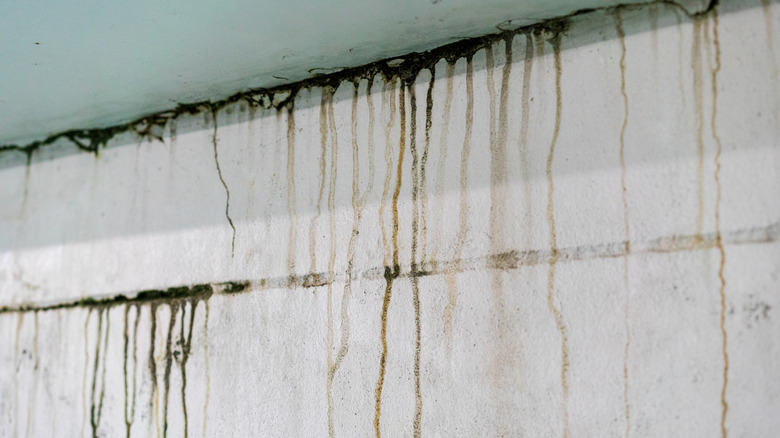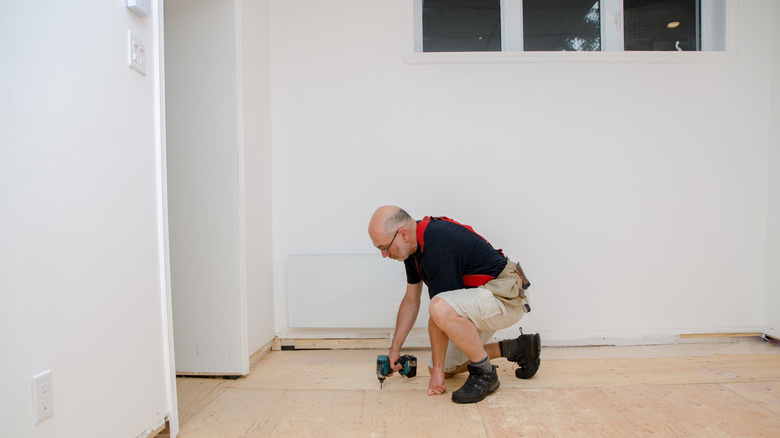The Popular Home Renovation HGTV's Mike Holmes Doesn't Recommend Right Off The Bat
We may receive a commission on purchases made from links.
When you move into a new home, it's easy to get excited about its potential and start immediately tailoring the space to your needs. Maybe you're envisioning an in-home theater, a customized gym, or even a bathroom upgrade. But resist the temptation to rush into a basement beautification project. According to professional contractor and HGTV star Mike Holmes, it's best to postpone any basement renovations until you're sure that the area is dry and stable enough to withstand any changes.
Even if the basement appears to be dry upon first glance, any issues associated with moisture in the basement such as leaks, seepage, or lingering groundwater could take anywhere from days to months to surface. After moving in, take time to live within the space and familiarize yourself with it before breaking out the hammers and paint swatches. Holmes advises waiting through at least one seasonal freeze-thaw cycle to monitor for any problems that could disrupt your renovation plans. This will give you a clearer picture of how the basement responds to varying conditions, while also helping to prevent damage to drywall, flooring, and personal belongings post-renovation.
It takes time to recognize basement issues
With more than 35 years of experience under his belt, Holmes knows there are a few steps you absolutely should not skip before finishing your basement. Among the most common issues he's witnessed are homeowners hiring bad contractors, skipping permits, or failing to properly insulate the space. Some projects went belly-up because someone clearly didn't know what to do immediately after finding water in the basement. In one particularly hairy renovation rescue, Holmes encountered a leaky basement because contractors failed to make sure the basement flooring was moisture tight.
"The extra space is tempting, but rushing into a project without accounting for water could lead to extensive water damage and costly repairs," Holmes explained on his blog, Make It Right, "You need to understand how your basement is handling water." Another Holmes tip? Avoid quickly drywalling in your basement so that it'll be easier to spot any signs that there's a problem with your home's foundation, especially cracks or leaks around the edges of the room. How will you know when it's safe to renovate your basement? "During the next major rainstorm, do a walkthrough of your unfinished basement," Holmes says (via Make It Right), "If you don't see any water, you're probably in good shape and ready to take on your renovation."
Preparing your basement after waiting
So, you've gotten fully acquainted with your basement and after a close and thorough inspection, you're confident that it's leak-free, structurally sound, and ready to renovate. Celebration is in order — but not before you've properly prepared the space. Even if you haven't spotted any leaks, start with waterproofing the area. This could include anything from plugging holes and cracks to resealing drafty windows and taking all other necessary measures to protect your basement from flooding.
Next up, perform a material check. Keep in mind that a properly prepared basement is one that's fully moisture resistant. To keep the walls dry and mold-free, use a product like GrizzlyGuard Closed-Cell Spray Foam Insulation and mold-resistant drywall. If you're laying down flooring, consider investing in a raised subfloor system. This will allow air to flow beneath your floors and form a moisture barrier to keep flooring safe, dry and in great condition. Next, take stock of your home's plumbing, ventilation systems, and electrical work and don't hesitate to call in a professional to make sure the space is code-compliant before you seal the basement and transform it into a rental unit, family hangout spot, or cozy hideaway.


